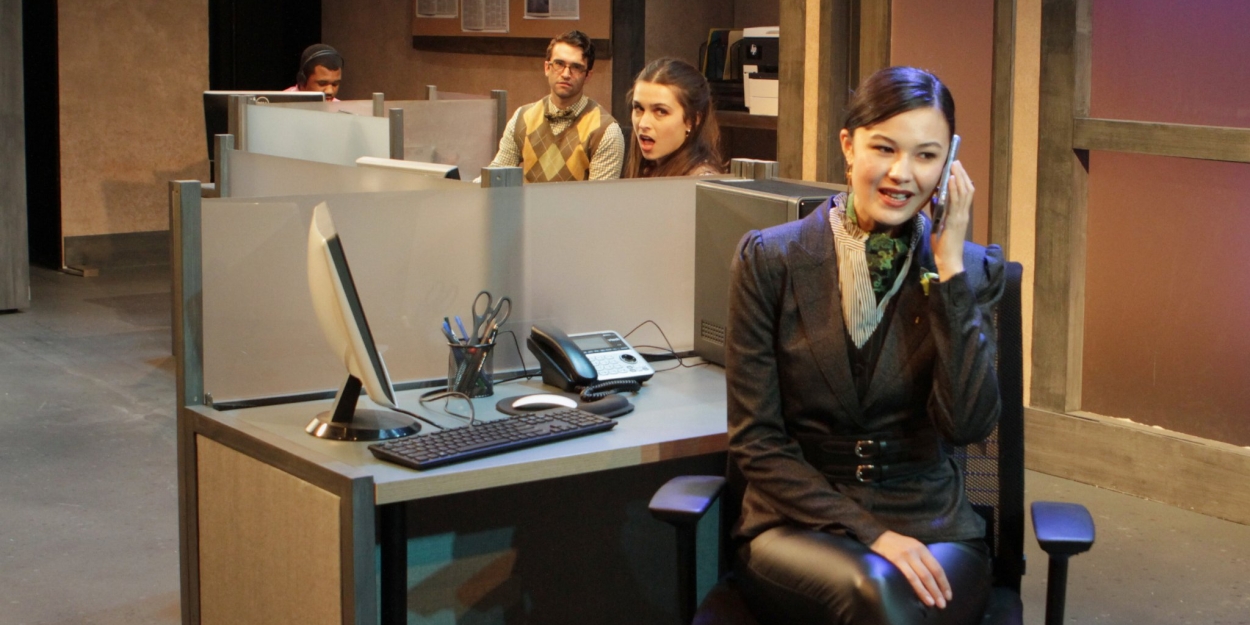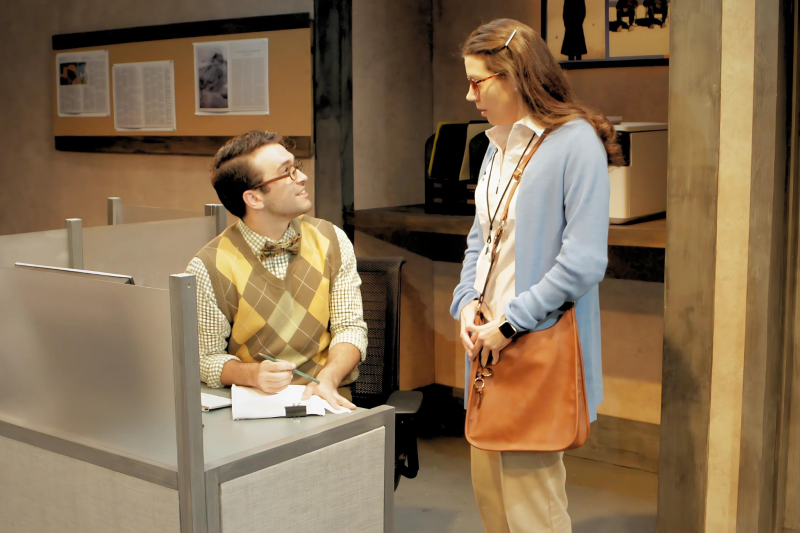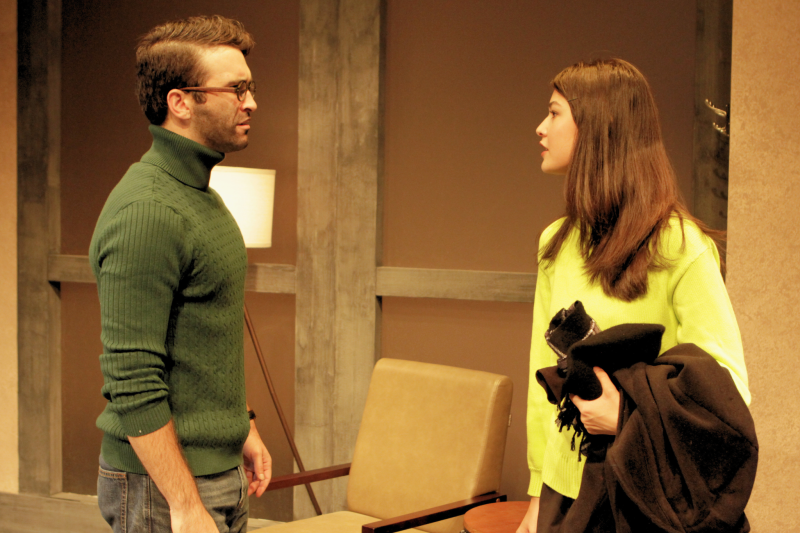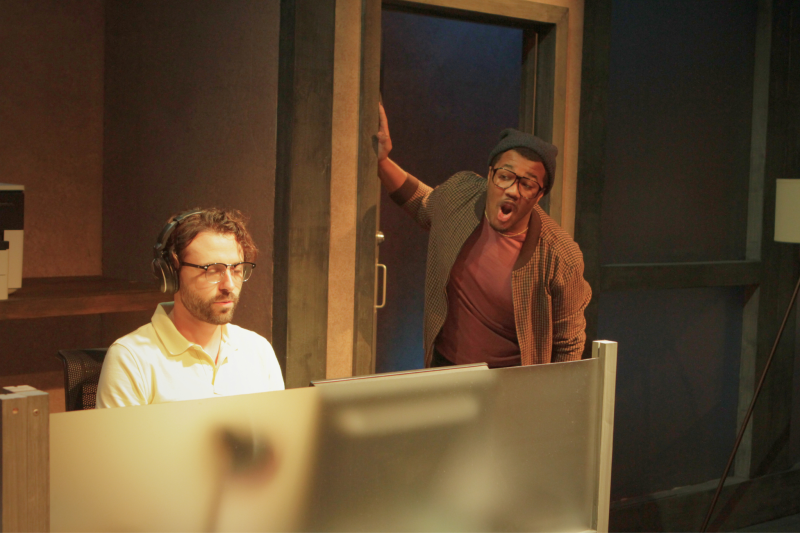Review: Chance Theater Presents OC Premiere of Dark Comedy GLORIA
The Pulitzer Prize finalist by playwright Branden Jacobs-Jenkins explores the tense, cutthroat world of the modern workplace.

Offering a sharp and multi-layered commentary on modern workplace culture, unchecked ambition, and the public-stoked commodification of trauma, playwright Branden Jacobs-Jenkins' intriguing play GLORIA—a remarkably riveting new dark comedy that was a finalist for the Pulitzer Prize—is currently having its OC premiere at Chance Theater in Anaheim through October 20 under the industrious direction of Marya Mazor.
Through its bold structure, witty dialogue, and biting satire, the searing play confronts the audience with plenty of uncomfortable truths about human nature, particularly in how some people respond to tragedy, and the ways that personal ambition and career advancement can warp some people's sense of ethics and empathy.
Set in the offices of a literary and lifestyles magazine in present-day, status-conscious New York City, the play first focuses on the lives of a group of smart, overworked 20-something editorial assistants sharing an open-concept workspace separated only by short cramped cubicles. The layout of the room—featuring Christopher Scott Murillo's convincingly chic modern office set design—provides an open environment for constant conversations... some volatile, some gossipy, and some downright mean-spirited.
As young working professionals, each of these assistants is driven by the need to move up in the company, but that is proving much tougher in these leaner days, it seems, particularly in an industry of legacy media conglomerates that are fast becoming more and more incompatible with the times, and, thereby, presenting further dwindling opportunities for career advancement.
In the first act, the audience is first introduced to several of the magazine's office workers: sharp-dressed, bespectacled Dean (Will Martella); meek and diplomatic Ani (Emma Laird); fashionably posh and often fashionably late Kendra (Audrey Forman); pleasantly eager and observational Ivy League intern Miles (Johnathan Middleton), and harried, overwhelmed lead fact-checker Lorin (Erik Scilley), who must often come into the assistants' room from the next office over to quiet down these outspoken young people and their frequently-shouted back-and-forth talks.

These often scathing talks, more than anything, reveal an emotionally stifling work environment that feels toxic, competitive, and draining—mostly due to the nagging, constant reminder that, perhaps, any kind of professional ascension here is fruitless, not only because of an industry-wide downturn but also because their much-older, longstanding superiors don't seem to want to promote their subordinates and/or leave their well-paid prestige positions.
Sharped-tongued, aspiring writer Dean, in particular, feels especially disgruntled even while still dutifully attending to the whims and demands of her direct boss, Nan. Across the room, snobbish Kendra—determined to get what she feels she rightfully deserves—is highly ambitious and unabashedly dismissive of others around her. Ani, much quieter in her desire for advancement, is caught in between Dean and Kendra, trying to calm both of them down from slapping each other.
But, collectively, Dean, Kendra, and Ani are constantly vying for recognition, and their tense interactions reveal how this cutthroat atmosphere fosters cruelty, neglect, and dehumanization—so much so that they are even unjustifiably suspicious and unimpressed by the mere presence of young intern Miles in their periphery (the fact that Miles doesn't display any sort of ambition or any desire to be in publishing further infuriates them, falsely assuming he will somehow get promoted over them anyway).
By contrast, Lorin—slightly older than her colleagues—seems to be focused mostly on doing a good enough job to be able to justify his increased duties at the magazine, even if it means endless amounts of stress and frustration. He, hilariously, finds these younger crybabies understandably insufferable (and, in a way, we sort of agree with him).
In addition to these worker bees, we are also introduced to the play's enigmatic title character, the often gossiped-about Gloria (Brenda Lock), here portrayed as a lonely, odd employee who has toiled at the magazine for many years. She is pretty much largely ignored by her younger, savvier colleagues—further proven by her hosting an unsuccessful housewarming party that no one except Dean reluctantly attended the night before.
No surprise: Dean went to the party merely to appear kind and, perhaps, network with whomever shows up, but then proceeds to mock Gloria and her "sad" fully-catered party to his gossip-hungry colleagues the following morning.

Gloria, for her part, can't help but be office fodder. Slinking in and out periodically into the editorial assistants' workspace, Gloria's stilted speech and social awkwardness are painful to observe, often producing (unfortunately) some shared snickers between audience members and the characters on stage mocking her. As an "invisible" presence in the office, Gloria represents a person that can slip through the cracks in such an environment—which, sadly, foreshadows her future extreme response to this continuous alienation.
If the play's first act is filled with snide, biting humor that captures the pettiness of the characters, its second act further extends those behaviors as a means for personal fame and fortune.
The first act feels like a naturalistic office sitcom with sharp, fast-paced dialogue and humor that masks deeper tensions. The second act's shift to the characters' lives after a shared traumatic event brings the audience into a different tonal space. The bits of humor becomes darker and the commentary sharper. This structural change—from a contained office space to various locations where characters seek to capitalize on their trauma—forces the audience to reconsider their initial impressions of the characters and the office dynamic they witnessed at in the beginning.
The play's second act fast-forwards eight months after the first act's closing moments marked by a shocking explosive event that completely upends the lives of everyone working at the magazine. In its wake, we catch up with Kendra and Dean who are now trying to process that trauma—while also capitalizing on it.
Now in different, seemingly more hopeful stages of their careers, the two once combative colleagues agree to meet at a Starbucks close to their former workplace.
After some initial awkwardness—and some interactions with an intrusive barista (Middleton, in his second of three roles in the play)—we soon learn that each of them are attempting to sell their own separate first-person accounts of the event that happens at the conclusion of the first act—to be optioned as either a book, film, or even, perhaps, a TV limited series.

But, as it turns out, they are not alone in this pursuit: Nan (also played by Lock), Dean's former boss, is, surprisingly, also contemplating penning her own autobiographical book recounting the event from her, um, unique perspective.
Meanwhile, Lorin—who, by default, serves as the moral conscience of this play—is the only character who seems uninterested in monetarily capitalizing on the event. Deeply scarred by what happened, he has no problem vocalizing his disdain for his now former co-workers' callousness for using their shared trauma for personal gain.
The play's Act 2 tonal shift exposes an even deeper dive into the characters' moral compromises and how their ambition and their need for recognition drive them, even in the aftermath of an event that had negative repercussions for so many of their peers. At the core of Jacobs-Jenkins' brilliantly absorbing play is its blatant critique of these individuals—particularly those raised from toxic, competitive environments—who later are more than willing to capitalize on tragedy for personal gain.
It can be argued that, normally, a person's expected reaction to tragedy is one of deep grief or personal introspection. Instead, Jacobs-Jenkins presents us with morally-questionable individuals so wrapped up in their own upward mobility that they see a sad event as an easy route towards what they've truly coveted all along: fame and monetary success.
The behavioral seeds planted in the first act rears its even uglier head in the second.
Here, Dean, Kendra, and Nan spend the second act in a race to turn their experiences into a consumable commodity—either by writing memoirs or shopping TV scripts—in an attempt to leverage their adjacent proximity to a media-covered event to boost their careers. This reflects the modern culture of exploitation, particularly in the profit-driven media industry, where a tragic event can often mean juicy material the public wants to absorb (I mean, just ask Ryan Murphy and his successful Monster anthologies).
Jacobs-Jenkins's dark tragi-comic play posits ambition as a driving force that erodes the characters' moral compasses. Rather than expressing grief, Dean, Kendra, and Nan seem more concerned with ownership over their respective versions of the event.

Photo by Doug Catiller.
The playwright's pointed commentary on the transactional nature of grief is unsettling, as it suggests that personal trauma is valuable only insofar as it can be monetized or converted into a "marketable" narrative catering to a rabid public eager to know more details. This is reflected in the initial exchanges we witness between Dean and Kendra, each trying to argue why their respective accounts are better suited to satisfy the public's thirst for details about their shared tragedy.
Clearly, Jacobs-Jenkins' play indicts not just the individuals involved in trying to sell a personal story but also our current society as a whole that incentivizes such behavior and their sensationalizing of tragic events.
The play's title character is initially treated as an easily dismissible, eccentric figure worthy only of mockery. But when that title character does end up doing an act that gets everyone's attention, her mystique suddenly rises and everyone around her—even those who barely knew her—suddenly becomes a viable source of information for media consumption. We are then shown the sad realization that media companies involved in a bidding war for material surrounding Gloria are less concerned about her true story and suffering than they are about the peripheral first-person stories of those around her that want to profit from it.
Engagingly rendered with biting wit and sharp dialogue, GLORIA is an absorbing, edge-of-your-seat play that commands rapt attention during its entire two-act structure. Despite its core dark subject matter, Jacobs-Jenkins effortlessly balances humor and jarring tension, creating a satirical yet tragic commentary on both modern work culture and the media's constant appetite to incentivize tragedy in exchange for monetary gain and notoriety for those willing to provide the content. The play does move quickly between different tones—from absurdity to horror, from irony to shame—while keeping the audience interchangeably engaged and shocked.
Within his verbose dramatization, Jacobs-Jenkins meticulously builds a world where a workforce that is undervalued, overworked, and constantly in competition with one another can turn into a microcosm of a capitalist environment where human beings are seen as tools for productivity rather than individuals with intrinsic value. The play, at its best, is a bold commentary on the intersection of trauma and media. By dissecting how individuals and industries react to tragic events, Jacobs-Jenkins raises questions about human empathy, careerism, and the ethics of storytelling.

Chance's production of this compelling play is quite exemplary, further enhanced not only by the theater's small footprint—placing the audience extremely close to the intense action—but also by the excellent work of its ensemble cast, many of whom play discernible multiple roles across two acts.
I was especially impressed with Forman's fiercely volatile speeches as Kendra (you will love hating her, but also maybe love her audacious IDGAF attitude) and with Martella's combativeness as Dean (he also plays a brief, comedic cameo in the second act as a hetero Gen-Z I.T. drone that is about the complete opposite of the more openly expressive Dean). Lock's highly-contrasting dual roles as both Gloria in the first act and Nan in the second act could not be anymore different—but each has a palpable vulnerability that prove memorable on both ocassions for very different reasons. Scilley is quite superb as Lorin who goes from anxious and distressed in the first act, to calmly rational in the second. Despite the transformation, the audience still sides with him as the play's sole moral anchor. Meanwhile, Middleton and Laird—also tasked with multiple roles in both acts—give ample and definitive acting support with their various characterizations.
Overall, Chance Theater's captivating production of GLORIA is a boldly incisive critique of modern society, presented with sharp comedic and dramatic tones that are both timely and unsettling. Funny one minute and uncomfortable the next, Jacobs-Jenkins' work here is vibrantly pointed and justifiably critical, and, yes, definitely worth seeing.
Follow this reviewer on Twitter / Instagram / Threads: @cre8iveMLQ.
Photos from Chance Theater's production of GLORIA by Doug Catiller.
-------
Chance Theater's Production of GLORIA continues on the Cripe Stage through October , 2024.
Chance Theater is located in the Bette Aitken Theater Arts Center at 5522 E. La Palma Ave., Anaheim, CA 92807. For more information or to purchase tickets, call (714) 777-3033 or visit www.ChanceTheater.com.
Reader Reviews

Videos

